Have you been yearning for a large, loving canine companion but are perennially thwarted by pesky allergies? Despite the fact that most lists will give you a bunch of petite breeds like Shih Tzu, Bichon Frise, and coton de tulears. But there’s no need to fret or forsake your dreams of owning a large dog breeds and keeping your allergies at bay. There is an array of larger dog breeds known for their hypoallergenic qualities that might just be your perfect match.
In this comprehensive guide, we’ve compiled a list of over 10 large hypoallergenic dog breeds perfect for allergy sufferers. We’ll delve into the wonderful world of these unique dogs, introducing you to breeds renowned for not triggering allergies. Additionally, we will explore the various factors that you should consider when selecting your next pet and offer some care tips for your future hypoallergenic hound. So, buckle up pooch lovers, and let’s embark on this journey to help you find your ideal, allergy-friendly, large dog breed.
Whether you’re an allergy sufferer or not, you might just discover your dream dog right here!
A Note About Dogs Being “Hypoallergenic”…
The term “low allergy” is often more appropriate than “hypoallergenic” when referring to dogs because it more accurately represents the reality of allergies associated with dogs.
The term “hypoallergenic” suggests that a dog is less likely to cause an allergic reaction. However, while certain breeds might shed less dander (the microscopic particles from a dog’s skin that can trigger allergies) and fur are labelled as big hypoallergenic dogs, no breed is completely hypoallergenic – even the hairless breeds.
Research indicates that all dogs produce some amount of allergens, and therefore, no dog can be 100% hypoallergenic. Therefore, even dogs typically advertised as hypoallergenic, such as Labradoodles and Schnauzers, can trigger allergy symptoms in sensitive individuals. It’s significant to note that allergic reactions can vary greatly among individuals, making it even more complex to label a breed as hypoallergenic.
Using the term “low allergy” is thus a more accurate description as it implies that a dog is less likely to cause allergic reactions, rather than unlikely to cause any allergic reactions at all. It confirms the fact that while certain breeds may produce fewer allergens, they are not completely allergen-free.
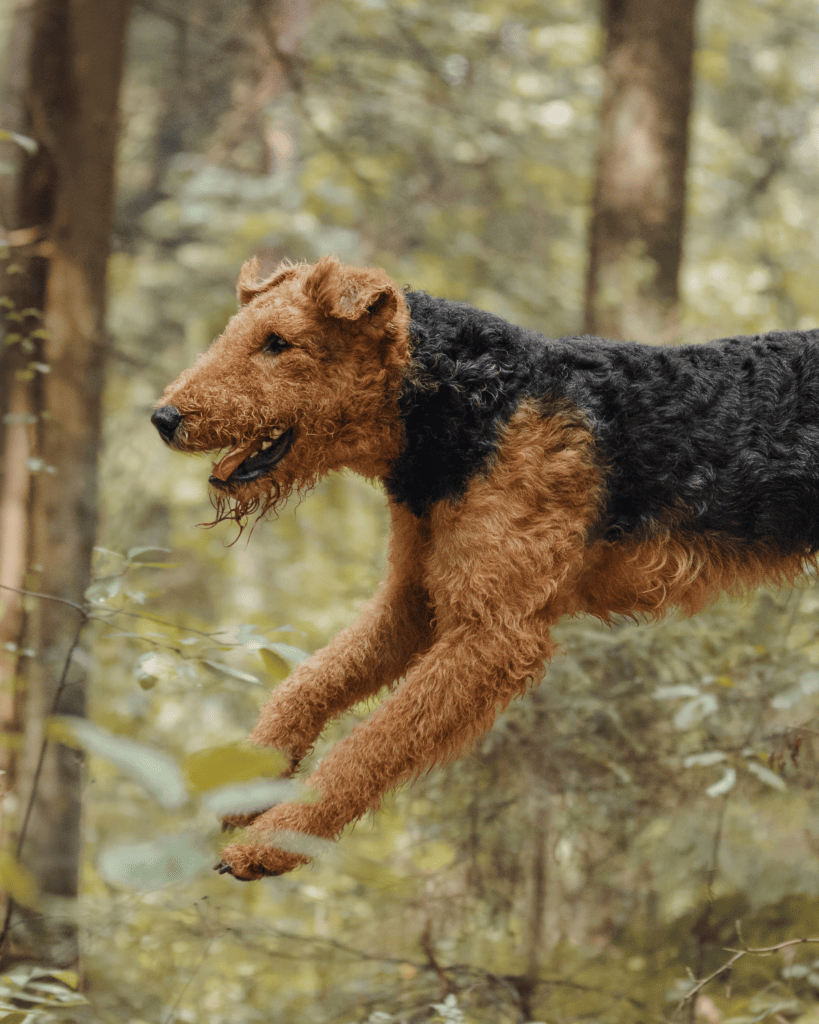
What Makes A Dog Low Allergy?
A “low allergy” dog, often referred to as hypoallergenic, exhibits characteristics that minimize common triggers often associated with dog allergies. Although it’s crucial to note that no dog is completely hypoallergenic, certain breeds are considered “low allergy” as they tend to produce fewer allergens.
Here are a few common features of low allergy dogs:
- Less Dander: Dogs produce a protein known as dander, secreted by their sebaceous glands and shed along with their hairs. Low allergy dogs often produce fewer amounts of this protein, reducing the likelihood of triggering an allergic reaction.
- Reduced Shedding: Many hypoallergenic breeds are those that shed less hair. Since pet hair can trap various allergens like dander, dogs that shed less can therefore also reduce allergen exposure.
- Lower Saliva Production: Saliva is another common allergen source. Breeds that drool less can be another subset of hypoallergenic dogs.
The degree to which an individual reacts to various allergens can vary profoundly, so it’s essential to spend time with a breed before deciding to bring one into your home.
10+ Dog breeds perfect for Allergy Sufferers
1 – Afghan Hound
Affectionately nicknamed the “king of dogs,” the Afghan Hound is a large, elegant, and hypoallergenic breed. This dog breed is well-suited for allergy sufferers due to its long, silky, and fine-textured coat which closely resembles human hair. Unlike typical fur found on many dogs, their hair-like coat has less dander – the microscopic particles from pet skin that trigger allergic reactions. As a result, this breed minimizes exposure to common allergens. Additionally, Afghan Hounds do not emit a strong doggy odor and shed minimally, making them ideal for people with allergies. Regular grooming and maintenance are crucial to keep their coat free from tangles and healthy, further limiting the allergen risk.
2 – Airedale Terrier
Often referred to as the “King of Terriers,” the Airedale Terrier is the largest of the terrier breeds and perfect for allergy sufferers. This breed boasts a hypoallergenic, double-layered coat: the outer coat that is wiry and tough, and the inner coat that’s soft and dense. The Airedale’s coat naturally produces fewer allergens and only sheds minimally, thus reducing the amount of fur and dander in your home. More importantly, their coat protects against outdoor allergens that other breeds would bring into your living spaces. Regular grooming is essential to keep their coat healthy and mat-free, as well as to further minimize allergen exposure.

3 – Bergamasco Shepherd
Originating from the Italian Alps, the Bergamasco Shepherd is an ancient sheepdog breed distinguishable by its unique, abundant coat. The Bergamasco’s coat is characterized by ‘flocks’, or loose mats of hair, which cover the body and legs and protect the dog from weather and predators. These dogs are low-shedding, making them a suitable option for those with allergies. Beyond their distinctive appearance, they are intelligent, patient, and diligent, traits they developed while working closely with shepherds in rugged mountain conditions. Bergamasco Shepherds are great companions, standing out for their deep bond with their human family, adaptability, and easy-going nature.

4 – Bouvier Des Flandres
This would be my choice if you were looking for a low allergy alternative to a german shepherd, or a Belgian malinois. The Bouvier De Flanders are great dogs, though are a high-energy breed. formidable and hard-working dog originated in the farmlands of Flanders, France. Known for their strength and determination, Bouviers were commonly used for herding cattle and pulling carts. Covered from head to toe with a thick double coat of fur, they often appear larger than they actually are. Their fur, a distinctive feature, is rough, thick, and can be of varying shades of fawn, black, grey or brindle. While they shed less than other breeds, their fur still requires regular brushing to prevent matting. In terms of personality, they are known for their intelligence, calm demeanor, and loyalty to their family. Bouviers are definitely a powerful breed, but with a heart of gold.
5 – Old English Sheepdog
The Old English Sheepdog is a large breed with a shaggy, double coat consisting of a waterproof outer coat and soft undercoat. While this breed does shed, their fur type is less allergenic compared to other breeds. Hair-like strands tend to hold onto dander instead of releasing it into the surrounding environment, making them a more suitable choice for allergy sufferers. Regular grooming, brushing, and trimming will further help control allergens, keeping both the dog and the home environment clean and well-maintained.

6 – Standard Poodle
Poodles come in three sizes – Toy, Miniature, and Standard – and all varieties are known for their hypoallergenic properties. The Standard Poodle is the largest of the three and is incredibly adaptable to allergy sufferers. The reason Poodles are allergy-friendly is their unique non-shedding coat made of dense, curly hair which captures most of the dander. Consequently, allergens are less likely to spread throughout the living environment. Regular grooming, brushing, and clipping not only keep them looking sharp but also help manage allergens, ensuring a clean, healthy, and comfortable environment for allergy sufferers.
7 – Giant Schnauzer
The Giant Schnauzer is a hard-working, intelligent dog breed with a hypoallergenic coat. Their dense, wiry coat sheds minimally and is less prone to dander production, making them a great option for people with allergies. These loyal and protective dogs require consistent grooming to keep their coats mat-free and to further mitigate potential allergens. Regular clipping, stripping, and brushing will not only keep the Giant Schnauzer’s distinct appearance but will also maintain their hypoallergenic qualities.
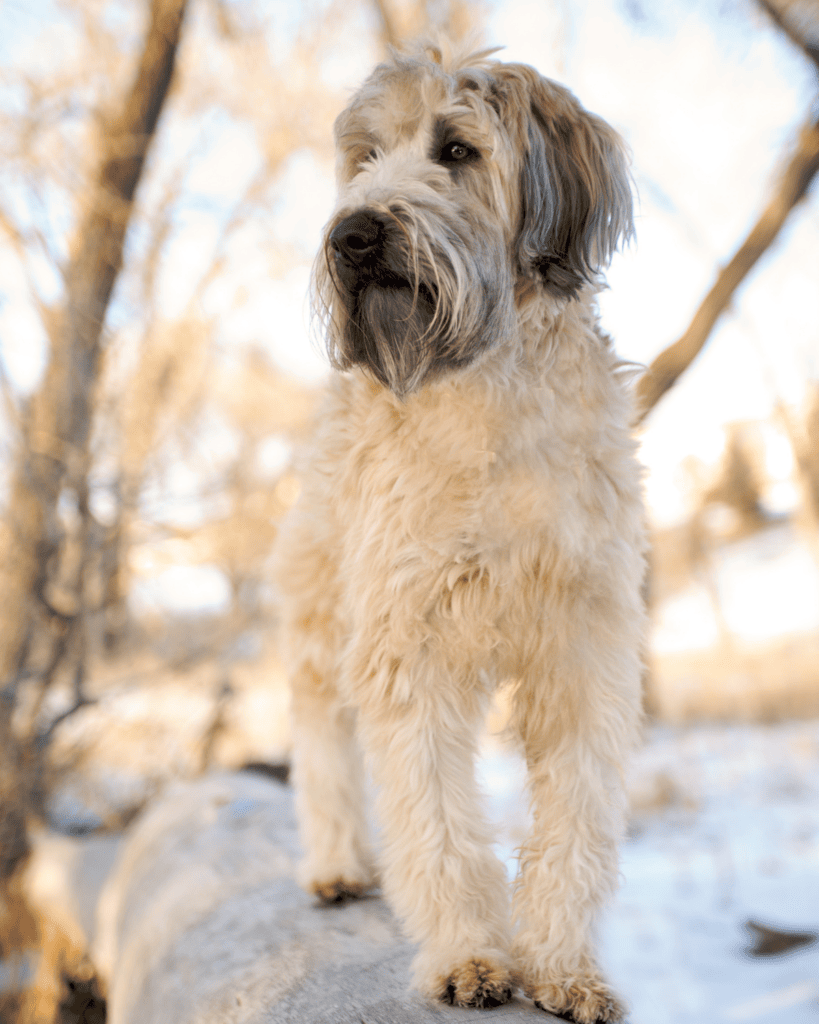
8 – Soft-Coated Wheaten Terrier
A playful and affectionate family dog, the Soft Coated Wheaten Terrier sport a single-layer coat and a hypoallergenic coat. With soft, silky, wavy hair that does not shed excessively, they’re less likely to exacerbate allergies. The hair of Wheaten Terrier captures much of the dander, preventing it from spreading throughout your home. However, they will still require regular grooming and brushing to keep their beautiful coat free from mats and tangles and to maintain their hypoallergenic nature.
9 – Irish Water Spaniel
The Irish Water Spaniel is a large, hypoallergenic breed that owes its allergy-friendly status to its distinctive waterproof coat. Possessing tight curls and a unique “liver” color, their coat is both dense and oily, providing excellent protection from water and harsh weather. Unlike many other breeds, the Irish Water Spaniel doesn’t shed much, meaning dander levels and other allergens often associated with shedding are reduced. Frequent grooming is essential for keeping their coats tangle-free and healthy, which also helps limit the presence of allergens. This breed’s intelligent, playful, and friendly personality further makes them a delight for any household, especially for those with allergies.

10 – Portuguese Water Dog
The Portuguese Water Dog is a large, intelligent breed with a thick, waterproof coat. This breed’s coat can either be wavy or curly, and both types are considered hypoallergenic. Originating as working dogs that assisted fishermen they’re loyal companions to good dog owners, their coat is built to repel water and debris, which includes allergens. Minimal shedding and lower dander production make them a fantastic choice for allergy sufferers. Grooming and trimming every couple of months will help maintain their coat in prime condition and keep the allergy risk at bay.
+ Doodles (Such as Labradoodles, Goldendoodles, Newfiepoos etc)
Doodles are “designer breeds”, typically a cross between a Poodle and a Labrador Retriever (Labradoodle) or a Golden Retriever (Goldendoodle). Due to the Poodle’s hypoallergenic nature, Doodles often inherit these qualities. Their coats can range from wavy to curly and require regular grooming to prevent matting and maintain their hypoallergenic status.
A well bred Doodle tends to shed minimally, which in turn, results in less dander and allergens being dispersed throughout the living space. With a friendly, intelligent nature, Doodles are wonderful family pets ideal for those sensitive to allergens.
Do remember though, that doodles do tend to get a lot of hate…
Considerations Before Choosing Your Breed
Before purchasing or adopting a “low allergy” dog breed, there are several important considerations that will help you make a more informed decision:
Understanding of Allergens: First and foremost, it’s essential to understand that no dog is 100% non-allergenic. Some dogs can be considered “low allergy” or hypoallergenic, meaning they are less likely to cause an allergic reaction than other dogs. Whether or not you have an allergic reaction to a hypoallergenic dog depends on your specific type of allergies. Therefore, a healthcare professional’s advice can be immensely valuable in such circumstances.
Grooming Needs: Most low allergy dogs require regular grooming to maintain their coat and minimize allergens. Understanding the grooming needs of your prospective pet, and your willingness and ability to meet these needs, is an important consideration.
Lifestyle Compatibility: Each dog breed has unique characteristics, including their energy levels, temperament, and size. Make sure you select a low allergy breed that also matches your lifestyle and living situation. For example, some low allergy dogs like the Kerry Blue Terrier are known for their high energy and need for regular exercise.
Health and Age: The age and health status of the dog can also impact the severity of allergens. Puppies often produce fewer allergens compared to older dogs. However, as dogs get older and bigger, they produce more allergens.
Spend Time with the Breed: It’s advised to spend time with the breed before deciding to bring one into your home. This helps to identify if any allergic reaction occurs and can give you a sense of what it might be like to live with the breed.
Remember, everyone’s allergies are different. What might work for one person might not work for another. Therefore, it’s important to invest time in understanding your own allergies, the specific breed’s characteristics, and to consult with a healthcare provider or allergist before making your decision.

Low Allergy Companions
To wrap everything up, picking a “low allergy” dog breed can be a real game-changer in your pet parenting adventure, especially if you’ve got the sniffles just thinking about dog allergies. But, remember to take the term “hypoallergenic” with a grain of kibble – no pup is completely hypoallergenic and each little bundle of fur comes with its own set of allergy triggers!
When making your choice, consider whether you’re up for the all-important grooming rituals (think fabulous doggy spa days), whether the pup’s activity level matches yours (couch potato or world explorer?), and how the dog’s health and age fit in with your life.
A great tip is to try a “doggy date” before making it official! Spending time with the breed can show you if any sneezes or watery eyes lie in your future, and lets you catch a glimpse of what daily life would be like with your potential new roommate.
Chatting with a healthcare provider could even make your dog-selection job easier and lead you towards a healthier decision.
If you want help choosing a dog, get in touch! I can definitely help you pick the right dog breed for you.

Author, Ali Smith
Ali Smith is a professional, qualified, and multi-award winning trainer is the founder of rebarkable. She has always believed animals deserve kindness and champions force free methods. Believing that dog guardians will all choose the kindest options if proper information is provided, she aims to help all dog guardians who need it and make dog training as accessible as possible
Ali lives win Maryland, US with her husband and her three dogs.
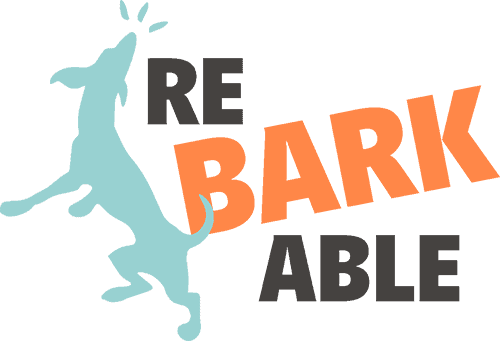
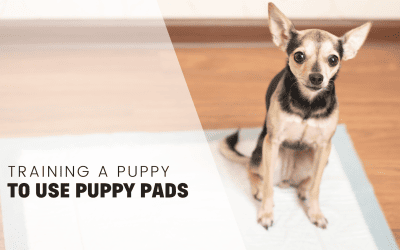
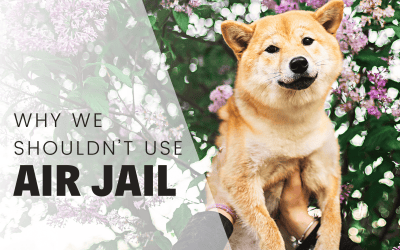
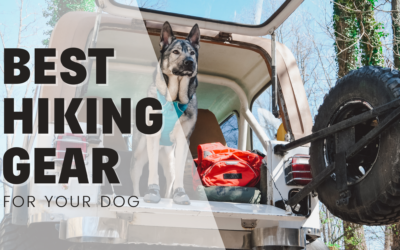

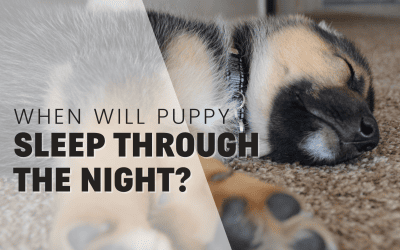
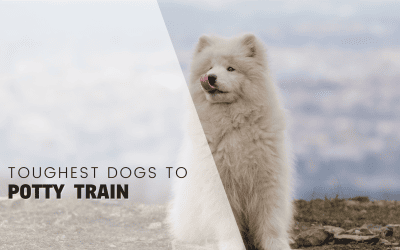
0 Comments